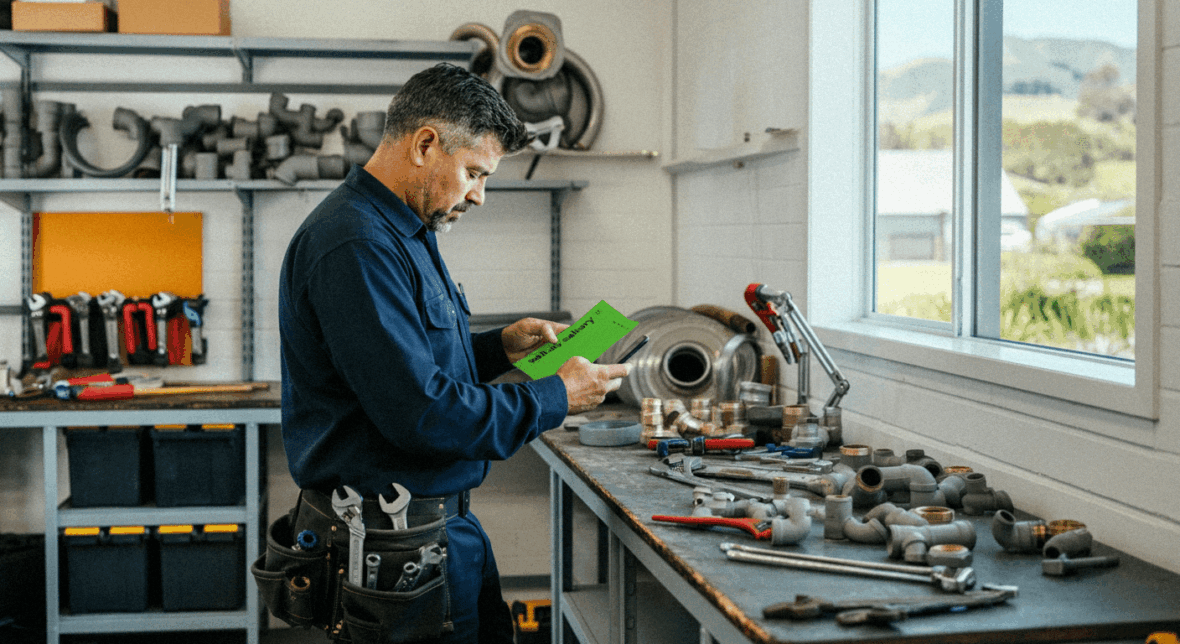The plumbing trade is essential, serving as the backbone for the efficient operation of homes and businesses across the UK. A competitive salary range influenced by experience, location and qualifications provides a steady income and opens doors to significant career advancement. This guide explores plumbers’ earnings, career progression opportunities and the training pathways that make this field both rewarding and dynamic.
Salary Ranges for Plumbers
According to the National Careers Service, a plumber in the UK can expect to earn between £21,000 and £40,000+, depending on experience and location. More experienced plumbers and those running their businesses could earn significantly higher salaries.
The average wage for a plumber in the UK varies based on experience and employment status:
- Entry-Level (0-3 years):
- Average Hourly Salary: £10.50 – £12.00
- Average Annual Salary: £21,000 – £25,000
- Mid-Career (4-9 years):
- Average Hourly Salary: £13.50
- Average Annual Salary: £28,000 – £35,000
- Senior (10-20 years):
- Average Hourly Salary: £22.50
- Average Annual Salary: £45,000 – £55,000+
- Late Career (20+ years):
- Average Hourly Salary: £25+
- Average Annual Salary: £55,000+
Salaries in Various Cities
Pay rates can vary significantly based on the region within the UK. Here’s a snapshot of plumber wages in different cities:
Location Salary Range
| Location | Salary Range |
| Central London | £34,311 – £40,000 |
| Manchester | £32,000 – £50,000 |
| Birmingham | £30,000 – £46,000 |
| Newtown, Powys | £32,541 – £55,000 |
| Chippenham | £38,870 – £53,625 |
| Penzance | £28,436 – £52,650 |
| Liverpool | £32,705 – £40,000 |
| Greenford | £44,674 – £50,000 |
| Hounslow | £38,836 – £44,000 |
These estimates can vary based on specific job roles and conditions.
What do Plumbers Do?
Plumbers in the UK are required to install, service and fix pipes, equipment and any apparatus associated with water and gas supply. Their tasks include:
- Installation: Intra-building services, including installing new plumbing systems in buildings.
- Maintenance: Periodically inspecting, assessing and monitoring existing systems to avoid dripping problems.
- Repairs: Repairing water leaks, clearing blockages and replacing faulty parts.
- Inspections: Conducting inspections to identify potential problems before they become significant issues.
Entry Requirements
General Requirements
- GCSEs: Some providers may require GCSE English and Maths at Grade 3 or above or Functional Skills at Level 1.
- Level 2 Plumbing Apprenticeship
- Level 3 Plumbing and Domestic Heating Technician Apprenticeship
Skills Required for Plumbers
- Mechanical and Physical Skills: Tool and machinery dexterity, adaptability, good vision and strength.
- Problem-solving and Technical Ability: Components of plumbing systems and how problems are identified and diagnosed.
- Communication and Customer Service: Interacting with the clients and serving the clients.
- Time Management: Plumbers often must juggle multiple tasks; therefore, managing time efficiently is essential to meet deadlines while ensuring quality work
Overview of Plumbing Apprenticeships
Salary for Plumbing Apprentices
Apprentice plumbers typically earn around £18,500 per year, a higher apprentice pay rate than other trades like bricklaying and electricians.
The salary for plumbing apprentices can vary based on the employer and location.
The National Minimum Wage (NMW) and National Living Wage (NLW) rates depend on age and apprenticeship status.
- Minimum Wage Eligibility:
- Must be at least school-leaving age for NMW.
- Must be aged 21 or older for NLW; NMW applies to workers aged 20 and under.
- Apprentice Rate Eligibility:
-
- Apprentices under 19 or those aged 19+ in their first year are entitled to the apprentice rate (£6.40).
- Apprentices aged 19+ who have completed their first year are entitled to the minimum wage for their age.
- Current Rates (April 2024):
-
- 21 and over: £11.44
- 18 to 20: £8.60
- Under 18: £6.40
- Apprentice rate: £6.40
From April 2025, these rates are set to increase, according to the government.
However, many employers pay more, especially as the apprentice gains experience and progresses through their training.
What Do Plumbing Apprentices Do?
Their tasks include:
- Installing and testing plumbing systems for hot/cold water, heating and drainage.
- Maintaining and repairing existing systems, including locating leaks.
- They work under supervision initially and progress to independent tasks as they gain experience.
- Organising work within the plumbing industry, identifying hazards and applying control measures.
- Adhering to health and safety standards while using tools and equipment safely.
After completing a Level 3 apprenticeship, apprentices can pursue various career paths, such as Fully Qualified Plumber or Specialised Roles in areas like gas engineering or low-carbon heating. With experience, they can move into roles such as project manager, site supervisor or even become chartered engineers.
Registration and Professional Development
Those who want further education after getting their apprenticeship qualification may attend professional organisations like the Chartered Institute of Plumbing and Heating Engineering (CIPHE).
Overall, professionals in the plumbing trade leverage their knowledge and skills, creating opportunities for continuous learning and career advancement. The field offers diverse pathways and earning potential from foundational training to advanced qualifications. As the demand for skilled professionals rises, plumbing is still highly profitable and an essential trade that makes people’s lives more comfortable.
